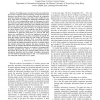Free Online Productivity Tools
i2Speak
i2Symbol
i2OCR
iTex2Img
iWeb2Print
iWeb2Shot
i2Type
iPdf2Split
iPdf2Merge
i2Bopomofo
i2Arabic
i2Style
i2Image
i2PDF
iLatex2Rtf
Sci2ools
133
click to vote
CORR
2011
Springer
2011
Springer
Contract-Based Cooperative Spectrum Sharing
—Providing proper economic incentives is essential for the success of dynamic spectrum sharing. Cooperative spectrum sharing is one effective way to achieve this goal. In cooperative spectrum sharing, secondary users (SUs) relay traffics for primary users (PUs), in exchange for dedicated transmission time for the SUs’ own communication needs. In this paper, we study the cooperative spectrum sharing under incomplete information, where SUs’ types (which capture the relay channel gains and the SUs’ power costs) are private information and are not known to the PU. Inspired by the contract theory, we model the network as a labor market. The PU is an employer who offers a contract to the SUs. The contract consists of a set of items representing combinations of spectrum access time (i.e., reward) and relay power (i.e., contribution). The SUs are employees, and each of them selects the best contract item to maximize its payoff. We study the optimal contract design for both weakly and ...
Related Content
| Added | 13 May 2011 |
| Updated | 13 May 2011 |
| Type | Journal |
| Year | 2011 |
| Where | CORR |
| Authors | Lingjie Duan, Lin Gao, Jianwei Huang |
Comments (0)

